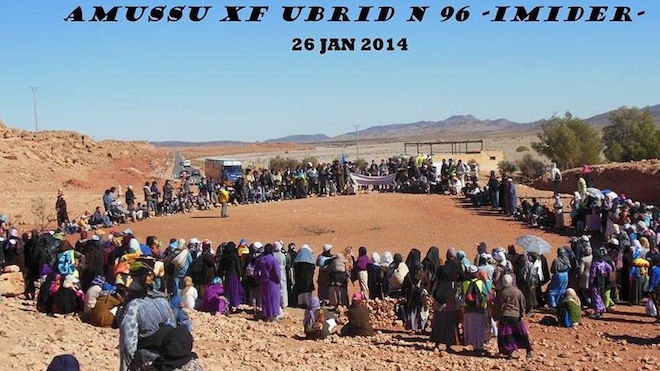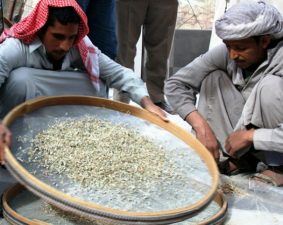Africa’s largest silver mine has been operating in the Atlas mountains since 1969, but the Berber people living in the surrounding villages remain among the most poverty-stricken people in Morocco. Now Movement on the Road ’96 are living in an “occupation” camp to protest a silver mine’s water use and pollution. They are also fighting for a fair share in the nation’s resource .
 Since August, 2011, the group of activists from Imider, who call themselves Movement on the Road ’96, have been living in an occupation camp on Mount Alebban in order to protest the mine’s polluting practices.
Since August, 2011, the group of activists from Imider, who call themselves Movement on the Road ’96, have been living in an occupation camp on Mount Alebban in order to protest the mine’s polluting practices.
While Africa’s resources are historically usurped by international companies, the Imiter Mettalurgic Company operating the silver mine is mostly owned by Morocco’s royal family, according to the New York Times. Which makes the lack of a sufficient “trickle down” effect perhaps more egregious.
“The king forgot about us. He tours the country helping people, and he never comes to this region,” one woman told the New York Times: “He is our father, and he has forgotten about his children.”
The group claims that the mine has used up more than their fair share of water, depleting aquifers that the agricultural communities in the area use for their terraced crops.
Read here about how the Berber’s had a perfect water use system in place.
Backed in part by the Free Academy in Rome (LAR), the Movement on the Road ’96 also claims that the toxic byproduct of the mining process, including cyanide and mercury used to treat the ore, has caused disease, killed livestock and exacerbated desertification.
“…even small plots at the foot of the mountain seem doomed to due to the shortage of water and poisons from the mine,” according to LAR.
Morocco’s Berbers are historically independent, organized and resilient, and once enjoyed a deeply entrenched system of water management that has been disrupted by international groups in recent years. The mine is said to have taken up to 66 percent of the water allocated in a special system to each village.
In 2011, some of the villagers from Imider climbed the mountain to cut off water supply to the mine. This resulted in a 40 percent capacity loss in 2012 and a 30 percent loss 2013.
Meanwhile, Farid Hamdaoui, a mine manager, denied allegations that they are improperly disposing waste, and says that the mine recycles 62 percent of the water they use.
The group, which takes its name from a 1996 uprising that the government violently suppressed, is demanding that local employees should make up 75 percent of the total workforce. Independent commentators say this is impossible, and the company accuses the group’s organizers of turning down offers for a feasible employment ratio.
Hamdaoui insists that the mine spends $1 million a year on the local communities, but LAR says that since operations began in 1969, very few infrastructural improvements have taken place.
“At Imider there are no schools (except a small garrison basic), there is no electricity in most homes, the internet [or] even kiosks with newspapers, while the nearest hospital is located 200 km away (Ouarzazate).”





